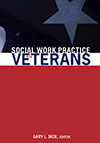 In times of crisis, service members answer the call of duty, making the ultimate sacrifice for their country. When our military service members are called to defend our nation, the entire family system is affected. The families of deployed service members are also called on to serve and sacrifice for their country as they continually accept, adapt, and adjust to the changes that accompany the various stages of the deployment cycle. Social Work Practice with Veterans is a comprehensive, evidence based social work book that addresses the multiple issues related to working members, veterans, and their families.
In times of crisis, service members answer the call of duty, making the ultimate sacrifice for their country. When our military service members are called to defend our nation, the entire family system is affected. The families of deployed service members are also called on to serve and sacrifice for their country as they continually accept, adapt, and adjust to the changes that accompany the various stages of the deployment cycle. Social Work Practice with Veterans is a comprehensive, evidence based social work book that addresses the multiple issues related to working members, veterans, and their families.
Service members who return from deployment often face a multitude of physical and mental health issues as reintegrate back into family life. Social workers serving military service members and veterans need to be competent and knowledgeable about the military culture and informed about the best practices. Written by multiple authors with a range of expertise in the field, Social Work Practice with Veterans also incorporates all of the 10 Council on Social Work Education Core Competencies. Chapters include:
- Social work and Veterans: The Call to Serve
- A Brief History of America’s Wars
- Theoretical Perspectives on the Motivation to Enlist
- The Role of the Social Worker
- Deployment: When a Parent Goes to War
- Fatherhood and the Military
- Military Children
- Gay Individuals in the U.S. Military
- Adjustment to Civilian Life
- Veterans and Mental Health
- Veterans with Posttraumatic Stress Disorder
- Veterans and Suicide
- The Signature Wound: Veterans and Traumatic Brain Injury
- Veterans and Substance Abuse
- Homeless Veterans
- War Casualties: When a Service Member Dies
- Incarcerated Veterans: Social Work in the Criminal Justice System
- Lessons from Those Who Came Before: The Experiences of Vietnam Veterans with Combat-Related Limb Loss
- CSWE Education Policy and Accreditation Standards: Core Competencies
The book integrates research, practice experience, case studies, theory, and social work values into a single text that covers the entire cycle of deployment and the complicated adjustments associated with post-traumatic stress disorder, suicide, traumatic brain injury, and substance abuse, and more.
To illustrate the comprehensiveness of the topics and issues covered in Social Work Practice with Veterans, editor Gary L. Dick, Ph.D., in his introduction writes:
When working with veterans, it is important to understand the social and historical time period in which they served in the U.S. military. We live in a dynamic, changing, and interdependent global community. We are all moving through time, and we respond to external changes in the world around us as we monitor our internal reactions to those changes. Conceptualizing the context of a veteran’s life from a systems perspective will provide a deeper appreciation of all the forces affecting veterans. The politics and public opinions surrounding the Vietnam War are different from those of the Global War on Terrorism. During the time it took to write this book, America’s views on gays in the military and gay marriage have changed. The country experienced the repeal of the Defense of Marriage Act of 1996, and the Supreme Court ruled to recognize same-sex marriages in states that permitted these marriages. The experiences of gays entering the military following the landmark decisions of June 26, 2013, will be very different from those who went before them.
Social Work Practice with Veterans is an excellent resource for social workers, counselors, and mental health professionals who work with the military community.



